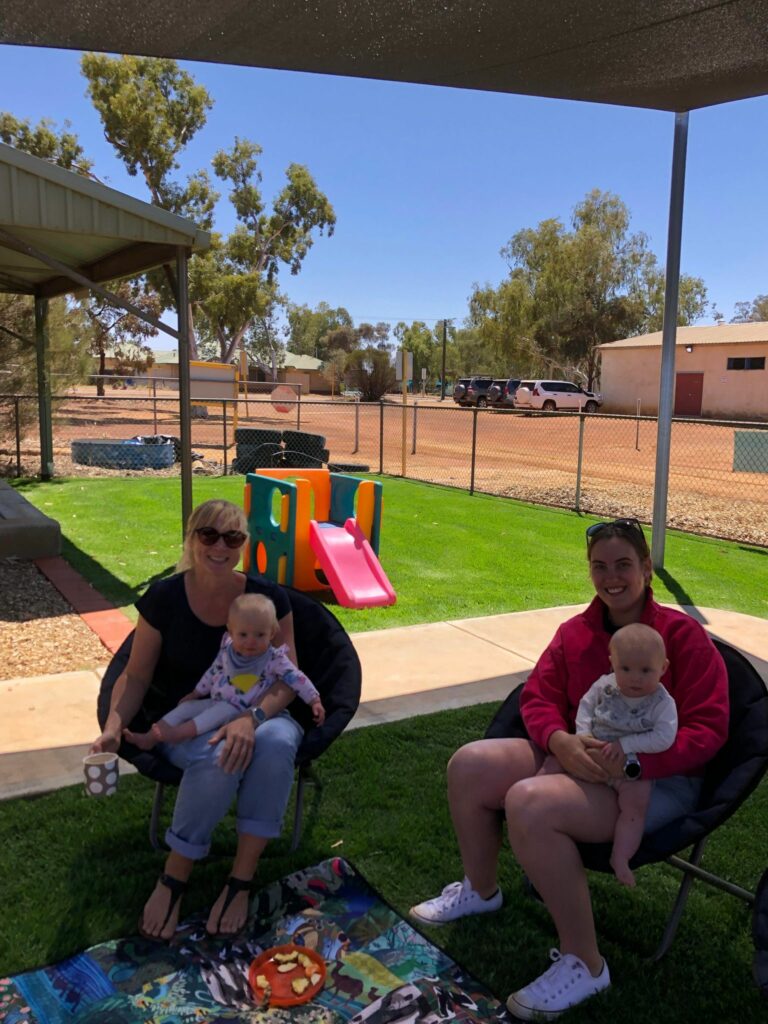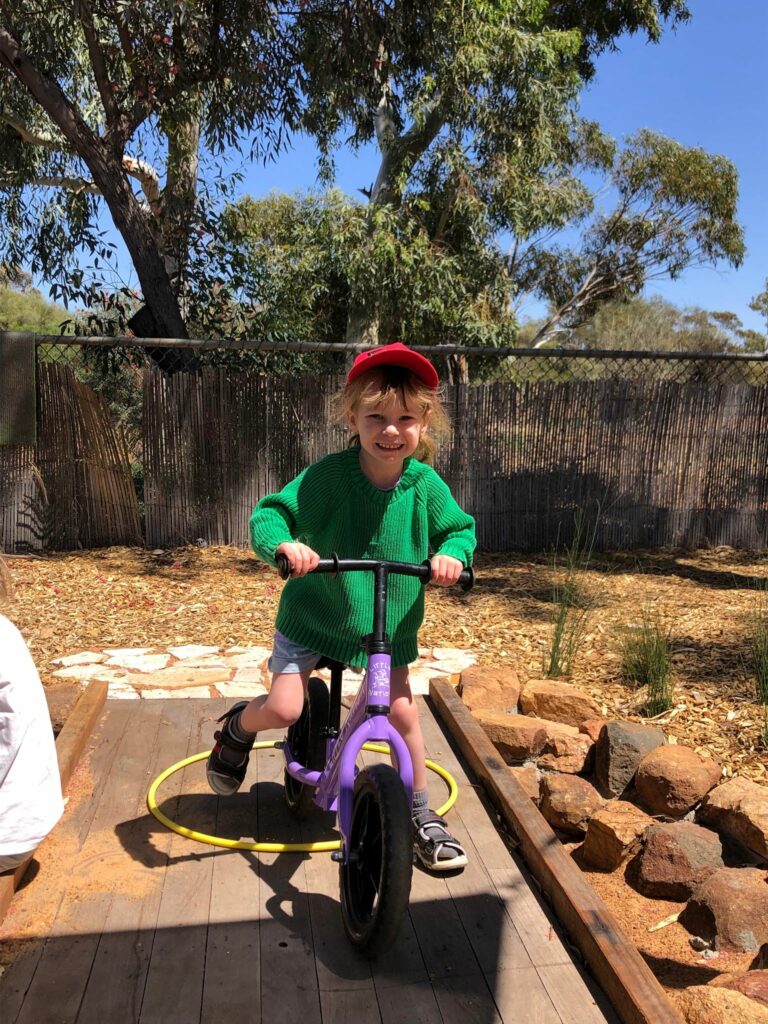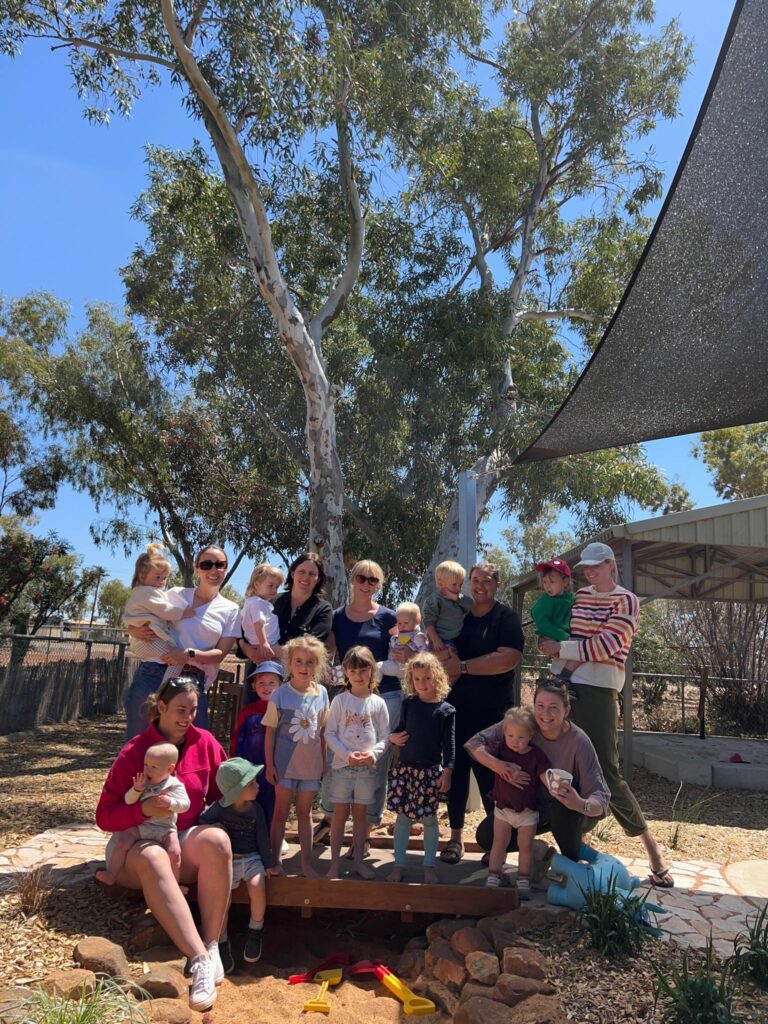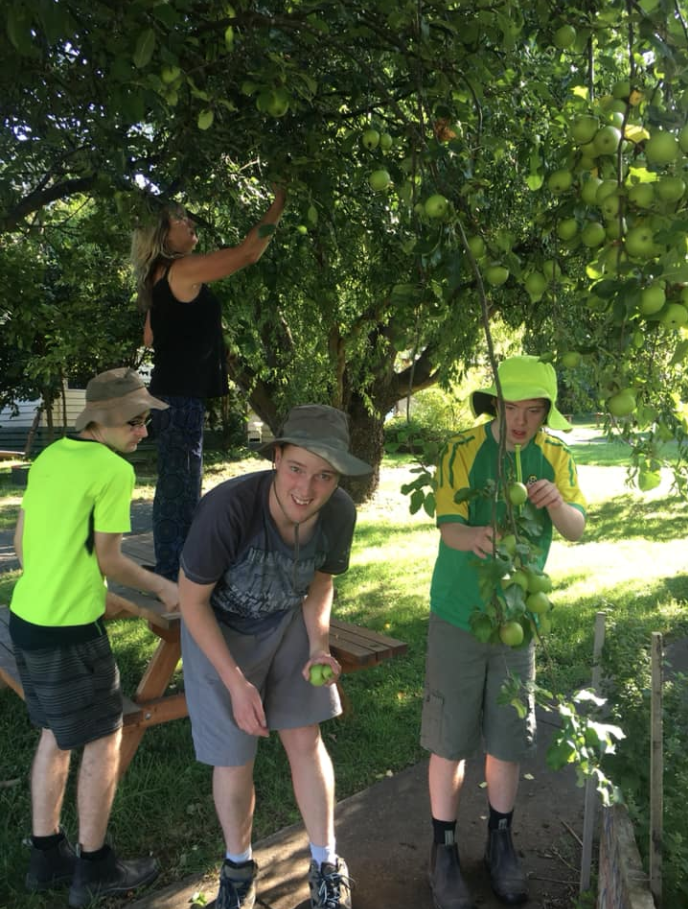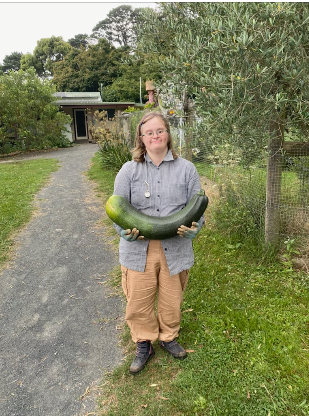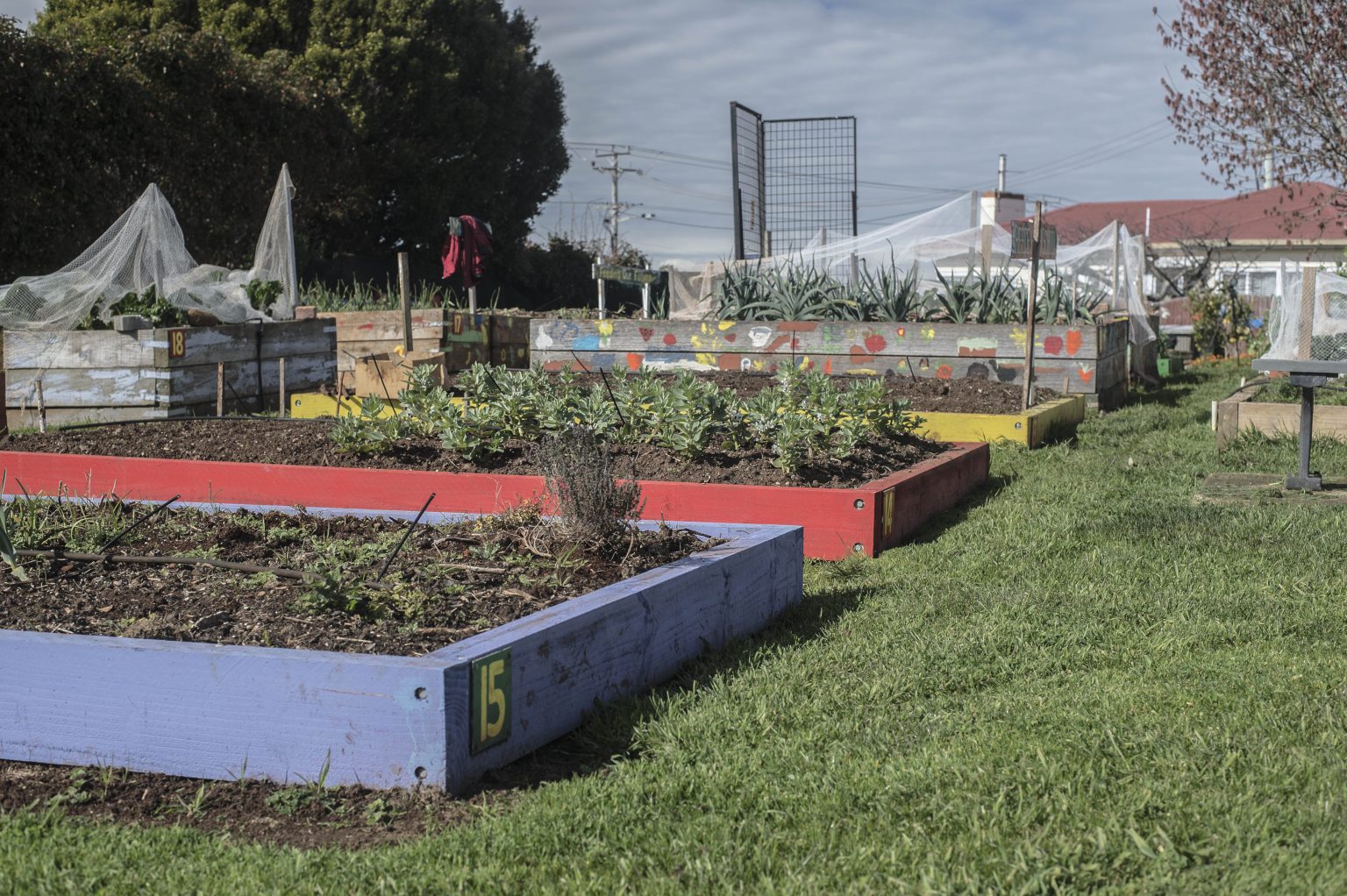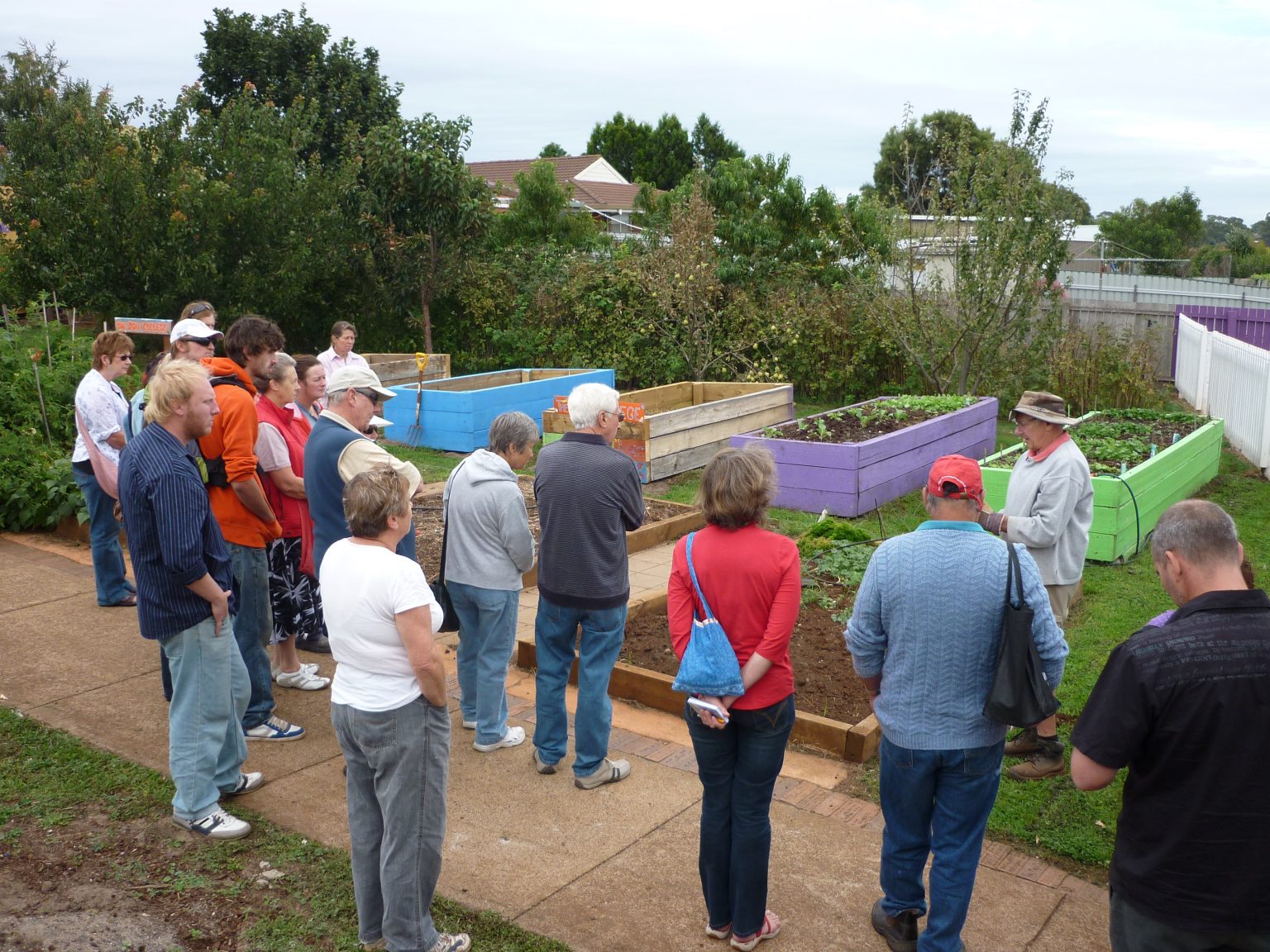Foundation for Rural & Regional Renewal (FRRR)
The wetlands leading to the Kiewa and Murray Rivers will soon be healthier, thanks to Parklands Albury Wodonga’s ‘Restoring Bonegilla’s blue carbon sink wetlands and waterways’ project.
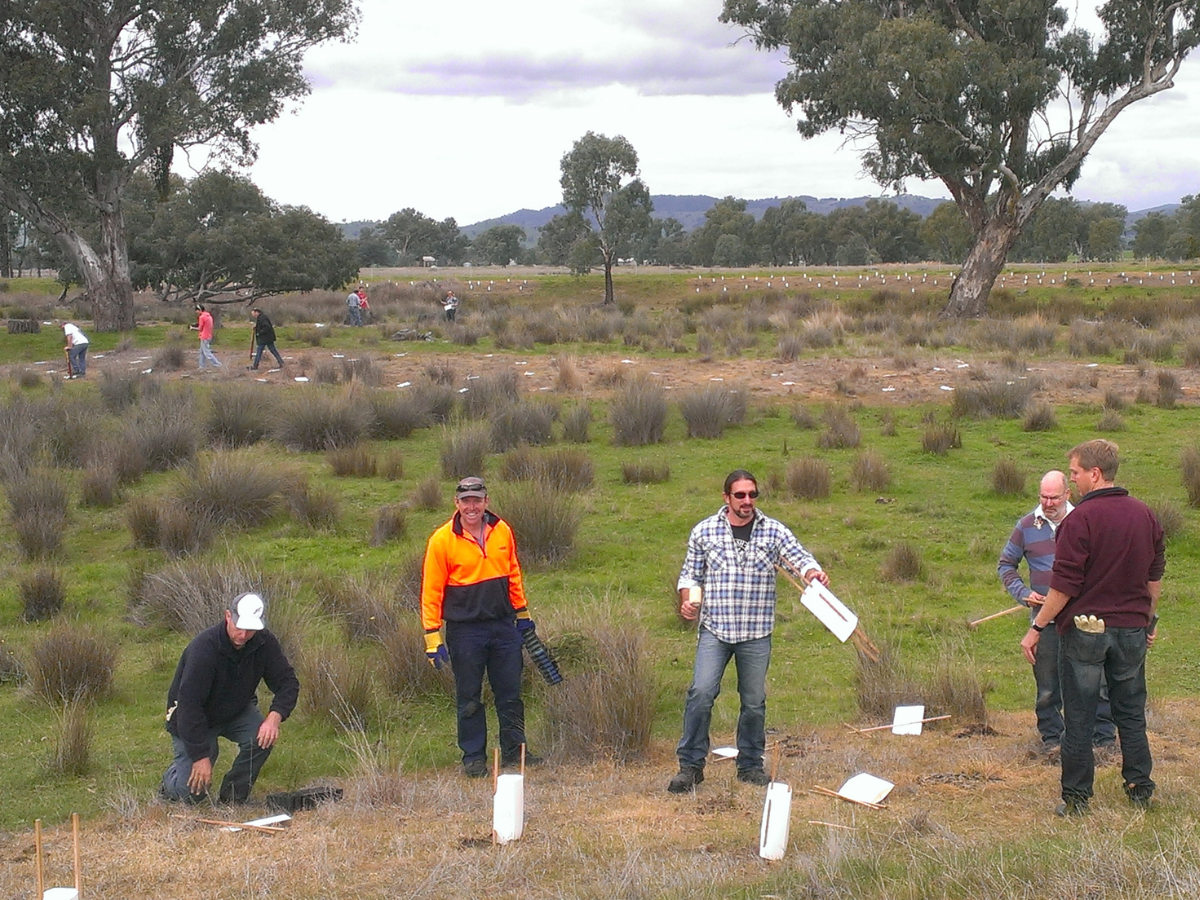
The restoration of wetland plants in floodplain channels and wetlands on these floodplains will capture carbon, slow water runoff and clean the water before it enters major waterways. This will improve water quality, while the restoration of these wetlands will close gaps in current native vegetation corridors, enabling native animals to travel and thereby adapt to the changing climate. The vegetation will also take up atmospheric carbon dioxide, storing it in biomass and sediments.
The project is aligned to decarbonisation and climate adaptation, with strong evidence of community-led development and strong engagement with local Indigenous Elders, disability services and volunteers at the Native Garden Nursery that the group operates.
Since 1997, with the support of more than 3,000 people each year, PAW has been restoring lands degraded by grazing and, more recently a housing development, improving and maintaining the network of bush parks connecting urban and rural communities in the border regions.
A volunteer Committee of Management works closely with the ranger staff to plan and implement rehabilitation, restoration and enhancement of bushlands and parkways for environmental management and recreation.
Volunteers at the nursery have been propagating suitable wetland species from hotter, drier places, which will mean biodiversity resilience as they are planting for a future hotter, drier climate. This well-planned adaptation and restoration project, which received a $16,060 a Community Led Climate Solutions grant, will deliver decarbonisation outcomes and engage the community in planting and developing skills and knowledge for climate solutions activity.
Following the February 2022 floods and the devastation experienced by community members within and surrounding Kin Kin, in southern Queensland, the Kin Kin Community Group (KKCG) shifted its focus towards future planning and the inevitable impacts of another natural disaster on their community. They aim to be better prepared with improved emergency systems to enable their people to operate more efficiently and effectively.
Kin Kin is a secluded southern Queensland hinterland community situated in the Noosa Council area, near its boundary with the Gympie Council. The town has very limited essential services, with only a single general store and café. The February 2022 floods took the town by surprise and left the community fending for themselves. There was no community-friendly meeting place or emergency response centre and the community was cut off by floodwaters for days. No one could enter or leave except by a helicopter from the oval. Food supplies depleted rapidly and communication was hampered, leaving the community in the dark about the ongoing situation. For four days there was limited telecommunication, making the community members feel even more isolated.
KKCG is dedicated to representing and promoting the Kin Kin community, and it was to this organisation that the community turned during their time of distress. The Group operates on behalf of the community, seeking opportunities, positive change and growth for its people. The volunteers are doing all that they can to ensure the community is prepared and supported for the future.
The effects of the 2022 flood events underscored the need for an Emergency Response hub, a place where volunteers and community can gather, to connect, communicate and plan together. The situation also highlighted the scarcity of resources available to support volunteers, including drinking water and first aid equipment. It emphasised the community’s risk areas and disadvantages, illustrating the need for better preparedness in the future.
Fortunately, the KKCG received a grant of $25,000 from the Rebuilding Futures program, funded by the Suncorp Group. This enabled the KKCG to purchase equipment and carry out activities to enhance the community’s safety, connection, resilience and wellbeing. This includes establishing a community hub that is publicly accessible at all times, including during natural disasters, and serves to provide comfort, connection, safety and distribution of essential resources within the community.
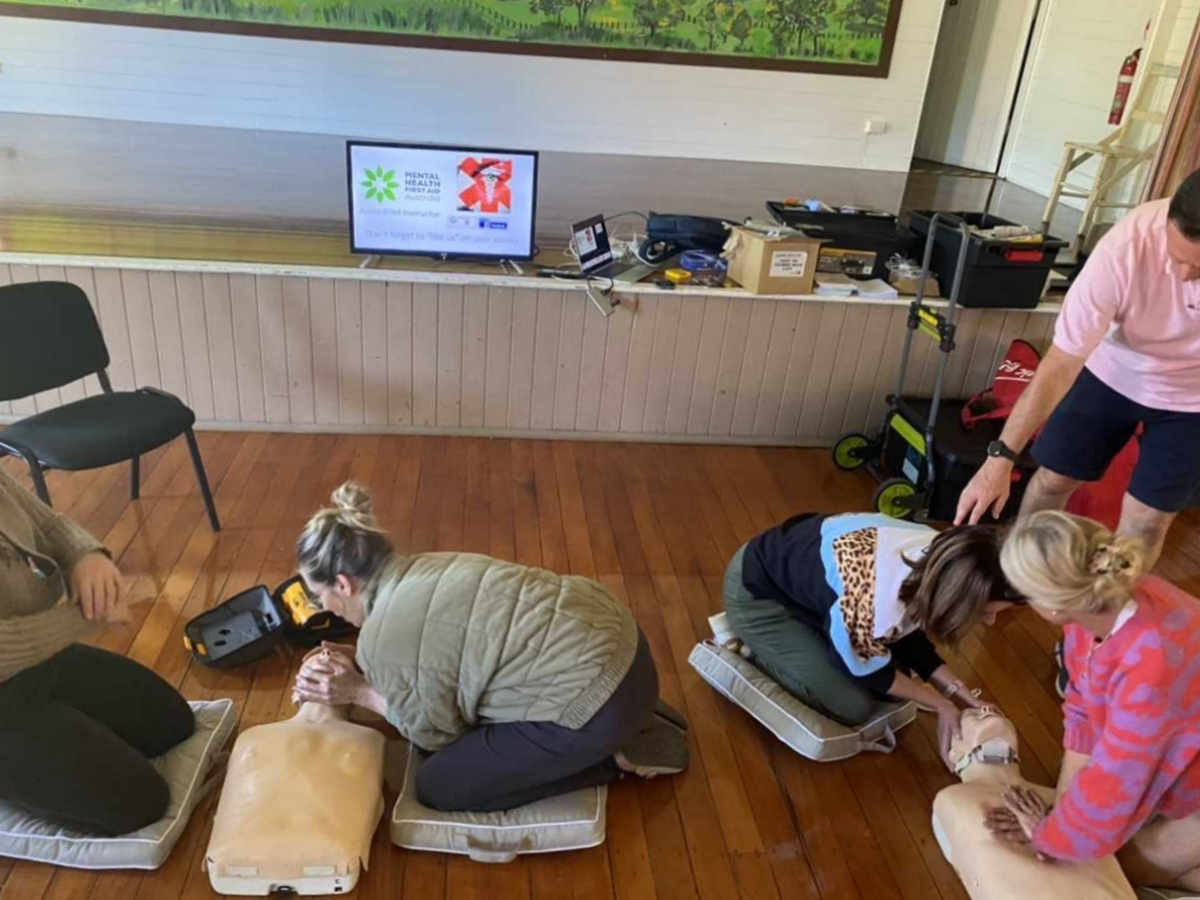
Specifically, the funds went toward essential office equipment such as computers, phones, an air conditioner, a printer, WiFi, first aid kit, a defibrillator, an emergency water supply and a community noticeboard. These resources aid in improving communication and growth within the community. The notice board displays disaster information and preparedness material from the Council and the Queensland Government, designed to better inform the community about disaster preparedness strategies. Furniture was also purchased, to make the space usable for community workshops and events that foster wellbeing and community connection. A recent example of such an event was a free first aid training day hosted by the KKCG. This workshop equipped volunteers with the skills to use the new first aid equipment and defibrillator in case of an emergency.
To combat volunteer fatigue and acknowledge the efforts of the Kin Kin volunteers, a ‘Volunteer Care Program’ was established. This program involves a monthly wellbeing initiative, allowing volunteers and community members to come together and connect. It bolsters the resilience and spirit of the community, fostering a sense of belonging and readiness to support others in times of need. The Community Hub is now equipped to meet the needs of the community in times of distress, with essential community resources and communication strategies focussed on supporting the overall health and wellbeing of the community. The hub, and volunteers who dedicate their time there, ensure that the local people, environment, culture and celebrations are embraced, fostering goodwill and prosperity. Indeed, it is the people and volunteers who have made Kin Kin an even more appealing and positive place to live.
Four Victorian philanthropic organisations have joined forces in an exciting $5 million partnership with the Foundation for Rural & Regional Renewal (FRRR) that will strengthen the capacity and resilience of communities over the next five years.
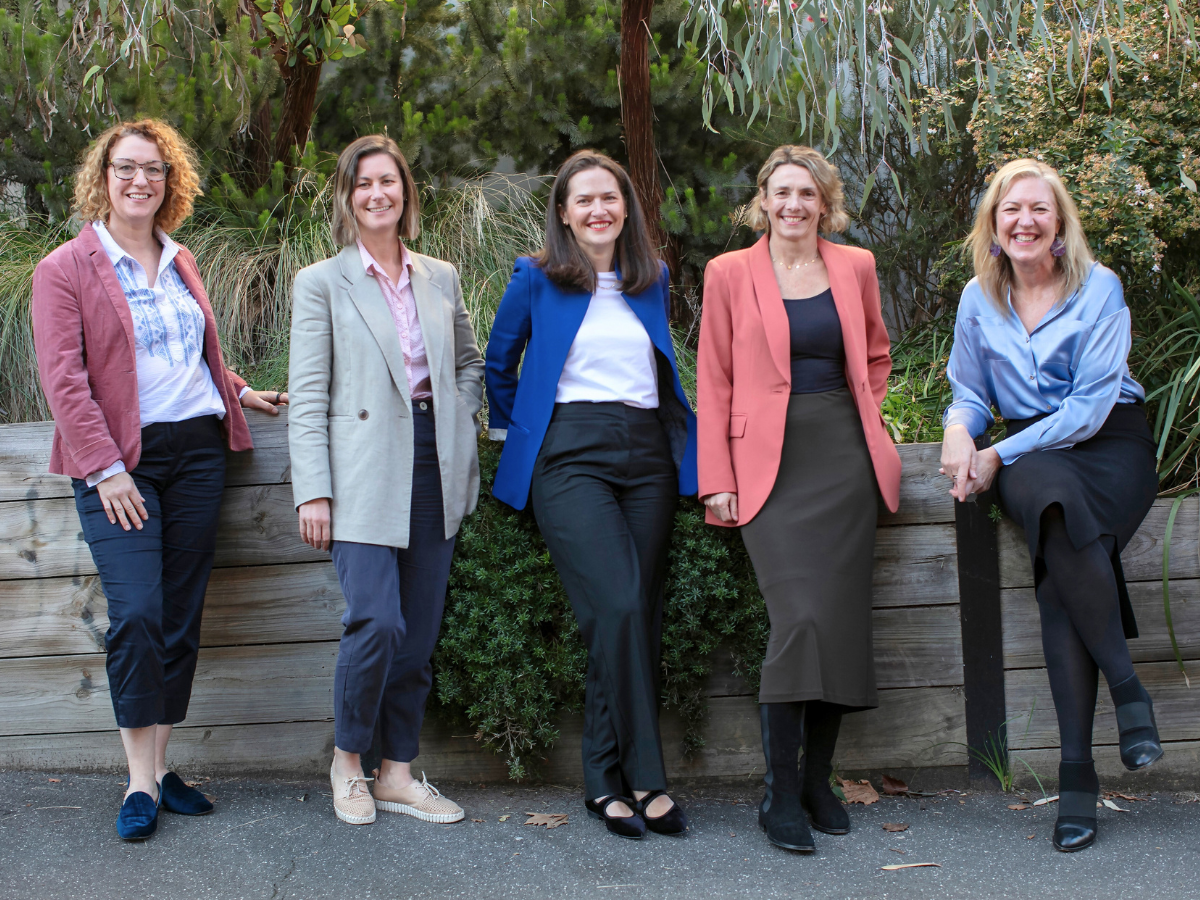
Three Victorian communities will be named later this year, following a detailed process involving needs analysis, mapping key issues, causes of disruption and the funding landscape, and an exploration of community readiness for the investment.
The partnership comprises the Helen Macpherson Smith Trust, the Jack Brockhoff Foundation, The Ross Trust, and William Buckland Foundation. FRRR will deliver the program, following the success of its similar Investing in Rural Communities Futures program (IRCF) in NSW over the past five years.
The funding will enable local not-for-profits (NFPs) to become more confident and collaborative in their approach to improving and sustaining the vibrancy, resilience, and liveability of their communities, ultimately enabling them to thrive, not just survive, especially during times of natural disasters.
“Investing in and strengthening the social and economic fabric of Victorian rural communities fosters long-term resilience,” says the CEO of FRRR, Natalie Egleton. “We know that our model can deliver these outcomes, and the multi-year model builds a whole-of-community approach.”
The $5 million funding will be used to employ local facilitators, deliver capacity building activities for the local NFPs such as governance training, volunteer development, marketing and fundraising support, and events. Funds will also be allocated to the three communities via grants for priorities and for organisational capacity building. Evaluation is central to the program.
The NSW program
The NSW program started in 2018 after FRRR recognised that many grassroots organisations were ‘locked out’ of philanthropy and often unable to access opportunities to invest in their own organisational capacity due to their size, distance, financial capacity, and lack of staffing.
“Most of the NFP work that happens in small towns is volunteer run and there just isn’t any money or resources to help them be sustainable,” Natalie said. “Local leaders know what is going to make the biggest difference in their community and we knew that supporting local solutions would be key.”
The program commenced in Junee, Leeton, and Nambucca Valley with the support of Vincent Fairfax Family Foundation. The Snow Foundation and Bendigo Bank then joined to enable FRRR to take the program to Ulladulla, Batemans Bay, Nowra, and Bay & Basin. The Australian Government provided additional funding to expand the program in the Shoalhaven region and launch the program in Bega through their Black Summer Bushfire Recovery Program.
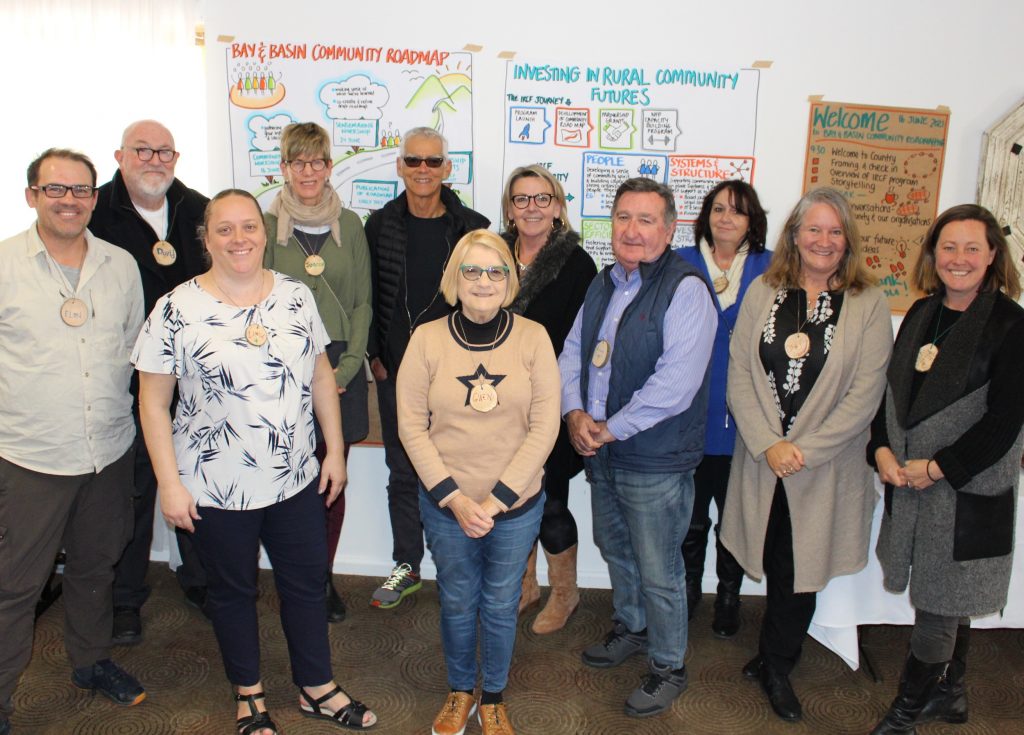
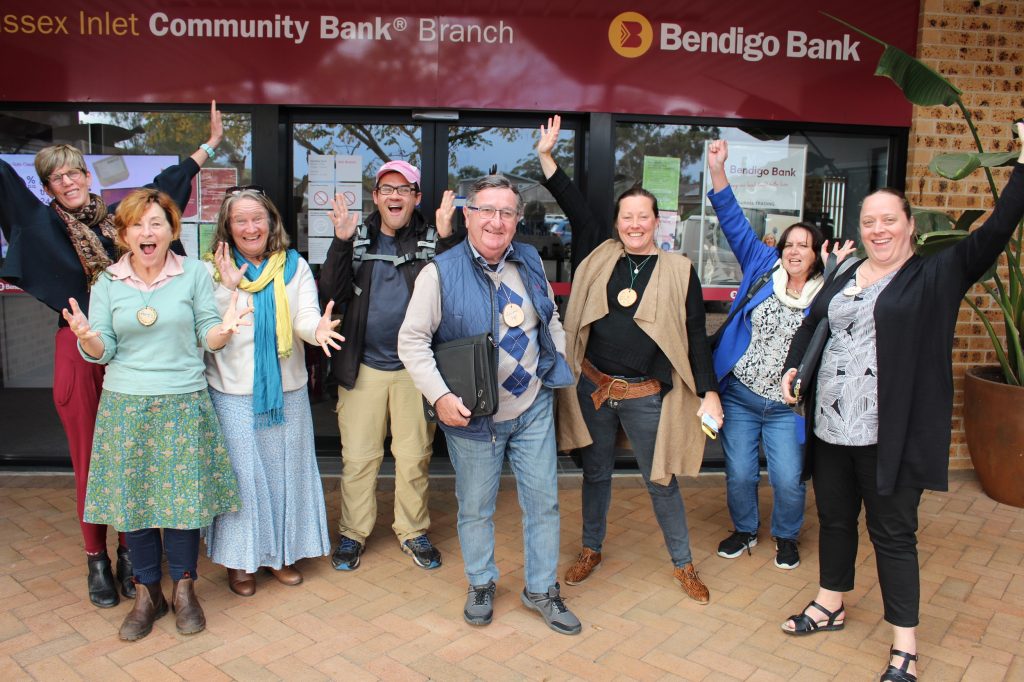
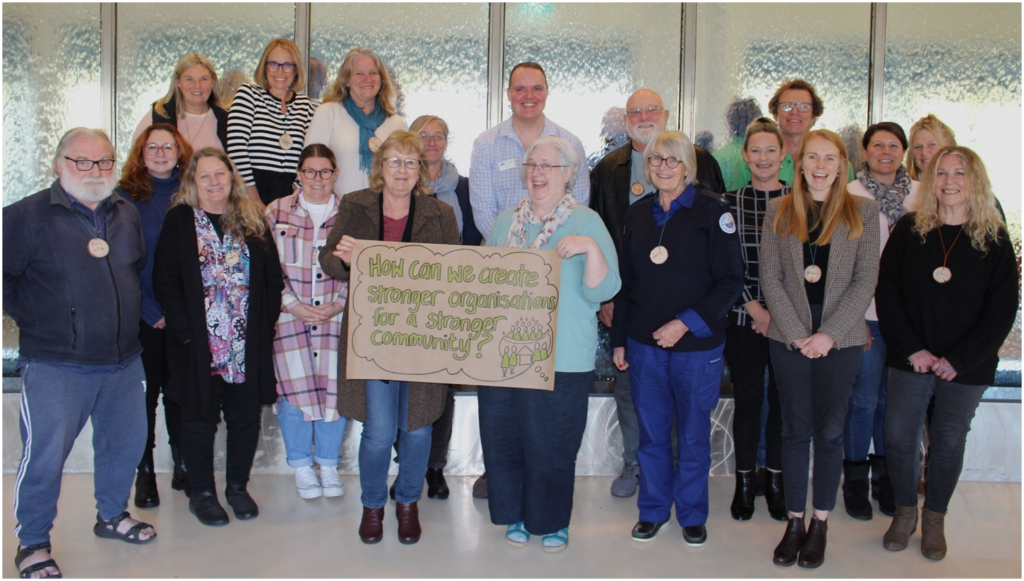
Evolution of the Victorian partnership
The plan to bring a similar program to Victoria began in late 2022 after The Ross Trust began discussions with FRRR and the Helen Macpherson Smith Trust. Conversations then began with the Jack Brockhoff Foundation and William Buckland Foundation. Importantly, the leaders in all these organisations had strong existing relationships and numerous granting collaborations with each other, as well as with FRRR.
“I could see that this program was about building the skills, resources and capacity of local not-for-profits – and that it was working,” said Sarah Hardy, the CEO of The Ross Trust. “It was also clear that any Victorian partnership would need a commitment of $5 million to get off the ground. That is a lot of money for any one mid-sized philanthropic, when we all have ongoing projects.”
Sarah said the positive and trusting relationships between the five organisations meant they were able to openly discuss whether it was a project that their trustees and directors would support.
The CEO at the Helen Macpherson Smith Trust, Debra Morgan, said the early conversations and resulting partnership benefited from like-minded organisations working together.
“We realised early that we couldn’t do anything this significant alone, and that working together would help us to affect better and longer-term change,” Debra said. “This collaboration sets a new bar in how we work together, and it’s certainly the longest-term project we have funded under our new strategy.”
Louise Kuramoto, the CEO of the Jack Brockhoff Foundation, said that it was the first time, other than a commemorative grant, the foundation had made a five-year commitment to a project.
“The philosophy behind this program is not unusual, but the amount and duration are,” Louise said. “The solid track record of FRRR gave all four funders the confidence to invest at such a scale. It’s wonderful that we can come together to support communities and the people in them.”
For the Grants Lead of William Buckland Foundation, Ferdi Hepworth, the program perfectly aligns with her organisation’s long commitment to country Victorians.
“We have had a long partnership with FRRR and more recently we’ve been funding a program where FRRR distributes small grants to communities, and we had already been talking about how we could better support them,” Ferdi said. “It was very easy to say yes to being part of this partnership.
“We often see governments and big business leading change, but it’s the people in the community who best know the ingredients required to help that community thrive. This project supports those people with the skills, knowledge, and confidence to work together to achieve change.”
After many emails, online and in-person meetings, visits to NSW communities, and discussions with their trustees and directors, the four funders set themselves a deadline of June this year to see if they could raise the $5 million to commence the program in July 2025. By April, they had done it.
“For four mid-sized philanthropic organisations to raise $5 million when we already have current commitments shocked us all, but in a good way,” Sarah said.
How the program will work in Victoria
FRRR will study past granting trends and community profiles and will map issues and disruptions occurring or on the horizon, as well as the funding landscape, to select the three communities. The process will also include community consultation, with a shortlisting process that will invite expressions of interest. Given the program is grounded in deep collaboration and co-design with each community, it is vital that there is a sense of readiness to embark on the five-year partnership.
Once communities are selected, a locally based community facilitator will work with the local NFP sector to scope priorities, gaps and opportunities that will be collated into a sector roadmap. The roadmap, which will be refreshed annually, will be the framework for activating capacity building activities and funding, and for monitoring progress, celebrating change, and adjusting priorities as needed.
Natalie from FRRR said she was confident many Victorian communities would be enthusiastic about the opportunity, adding that, like in NSW, it was likely the communities would be at very different starting points.
“Success is turning out to be different in each community, which is fine because the indicators we are interested in all focus on changes in mindset and sector collaboration to drive new and better opportunities for their communities – and that has been a major success,” Natalie said.
FRRR will employ a program manager who lives in Victoria and is familiar with key concerns and issues in the state. Local facilitators will also be employed in each community. Over time, it is expected that more than 20 people will be employed in the program. Staff and volunteers will benefit from training and professional development and possibly partnerships with councils, TAFEs and universities.
Deb Samuels is the People Portfolio Lead at FRRR and will oversee the Victorian project.
“We now have five years of NSW evaluation data and interviews and the recurring theme is that people in the communities feel much more empowered to make decisions and collaborate,” Deb said. “If they know a large grant opportunity is coming up, they know who to call to say, ‘let’s pool our efforts to apply’.”
Deb cited examples of success that could be replicated in Victoria, such as one NFP leader rallying to halt the closure of a local bank branch that was relied upon by vulnerable residents, and another leader now running for mayor.
“Local leaders involved in the IRCF program have shared they would not have had the confidence to do things like that in the past,” Deb said. Young people can also engage with the program and see themselves as an important part of the NFP sector.
“One of the best things somebody said to me is that ‘the funders believed in us and invested in us, and now we believe in ourselves and what we can do’.”
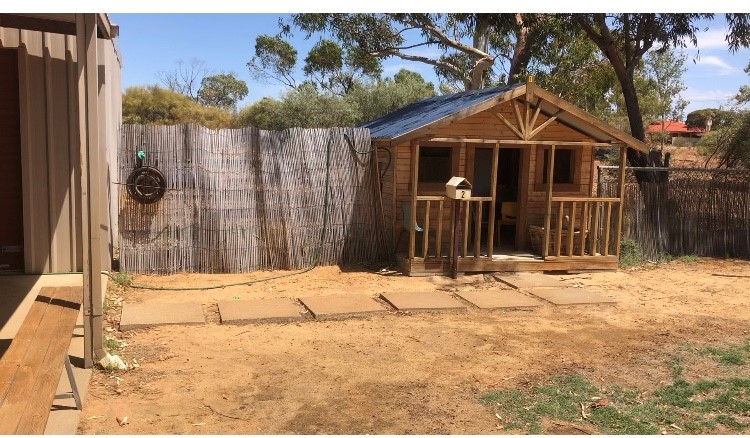 BEFORE
BEFORE
Morawa, a small town in Western Australia’s wheatbelt, lacks recreational and social opportunities for families with young children. With no cafes, the Morawa Playgroup, run for the last 40+ years, by mums (and the odd dad) serves as the primary gathering space for parents and caregivers seeking connection and support. However, Morawa Playgroup’s outdoor area was uninspiring, with a dying lawn and hard claypan soil.
Recognising the need for a vibrant outdoor space, the mums of Morawa Playgroup embarked on a project to transform their drab outdoor area into a nature playground. Collaborating with a local landscape designer, they developed a comprehensive plan to:
- Remove the old, inefficient irrigation system and replace it with a waterwise garden;
- Create a nature play space featuring sensory boxes, timber bridges, and a creek bed;
- Install shade sails to provide relief from the scorching sun and enhance the usability of the outdoor area;
- Establish seating areas for parents to connect and support each other while their children play.
The project unfolded over three years and received a boost from an FRRR grant of $9737, funded by Raine & Horne Foundation.
The completion of the project in September 2023 marked a significant milestone for Morawa Playgroup and the broader community. It’s now the only nature play space in the Shire, which spans 190km2, offering children and parents a welcoming and engaging environment. The shaded, waterwise garden has transformed the outdoor area, allowing children to play outdoors year-round and fostering a sense of connection among families.
Beyond the immediate benefits to the playgroup, the project’s impact extended to Morawa District High School, where reduced water bills freed up funds for educational resources. The positive effects of green spaces on mental wellbeing were evident at the opening of the new play space, signalling a brighter future for the community.
Despite the challenges of being a small, low socio-economic town, the project demonstrates the power of grassroots initiatives to improve quality of life. Morawa Playgroup’s success serves as a testament to the community’s resilience and determination to create a better future for its children and families.
Wagait Beach is located on the Cox Peninsula just west of Darwin and is accessible by ferry (15 mins) or road (90 mins). Young people make up around 14% of the 461 residents and beyond seasonal sports, there are very few organised activities on offer locally. Parents and young people alike had been keen to increase access to drug and alcohol free activities which would build skills and support emotional, social and physical wellbeing and in 2021, Wagait Shire Council supported to the creation of the Wagait Youth Group.
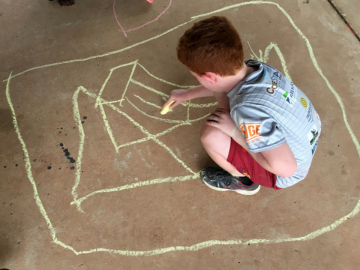
The Council received a Strengthening Rural Communities grant of $6,000 to assist with establishing their youth program that focused on building more opportunities in the community for young people including the co-design of a local Skate Park. Across four skate workshops, the children designed, built, and decorated portable ramps that went into immediate use, while plans are now well underway for the permanent skate park. Beach cricket, movie nights and discos for the school aged children have since followed.
In addition to a more physically active lifestyle, the young people felt listened to and have become more engaged and active in civic affairs. A collaboration developed between Health Lifestyle Seniors participants and the young people which saw the seniors sharing their skills such as cooking and sewing, which in turn built intergenerational bonds of appreciation and understanding.
Furthermore, the Council employed a Year 12 student for 12 months in the role of Youth Development Officer. This role takes the lead on designing, delivering, and reporting on the ongoing youth program. The Council hopes to continue offering this position annually and expand it into an internship, covering other aspects of council work and community service to develop youth leadership skills locally.
Yarra Valley ECOSS is an environmental and educational not-for-profit organisation based on a 7.4 hectare permaculture-designed farm at Wesburn, just east of Melbourne. Their vision is to promote local food production, earth education, and multicultural living, while building work skills and developing a vibrant, resilient, inclusive and sustainable community.
They play a critical role in their community, supporting people with disabilities, as well as providing food relief.
ECOSS currently has five part-time staff, supported by a management committee and an active and enthusiastic group of volunteers, students and work-experience partners. Like many not-for-profit organisations, their usual fundraising activities were curbed by the COVID-19 pandemic. ECOSS’s Executive Officer Chelsea McNab explained.
“At the beginning of 2021 we were all still thinking that 2020 was ‘the pandemic year’ and that 2021 would be able to go back to normal living.
“But there have been many adjustments – reacting to the ever-changing COVID restrictions and operating in a safe way. This includes constant updates to our COVID Safe plans, the ability to run programs and have people on site, purchasing of equipment, extra cleaning costs, building an outside kitchen and hand-wash stations, shutting down the office and staff working remotely, as restrictions require.”
Ms McNab said that with many facilitators and performers to account for, the costs of rescheduling events and school programs took a lot of staff time, and they have had to create new policies and strategies for adjusting to the instability of the times.
Despite it being a difficult year, ECOSS has actually shown its strength over the last six months.
“Our mission and focus on food security, volunteerism, and supporting small business have all been able to thrive through our Community Garden and The Valley Market. We have found that we are able to continue all of these aspects of our NFP during the pandemic. The Crops for Community program has also been able to continue through lockdowns, as it is seen as an essential service, offering our community members with disabilities a place to continue to come in the community garden, and continue to grow crops that are distributed to two local food relief agencies. There has been a huge demand for food relief this year, and we are grateful to be able to support these programs.”
The pandemic forced ECOSS to think outside the box, and they have attracted new co-locator tenants, whose rent increases their income, and also enables ECOSS to support the growth of small businesses run by locals and new migrants. Chelsea McNab again:
“We have learned that we have to be able to adapt to the ever-changing scenarios very quickly. We have also learned that co-locator tenants’ income is a great way to underpin our finances, and offers a richness of diversity to the site.”
ECOSS partnered with FRRR in April 2019 to open a Not-for-Profit Fundraising Account, which allows them to receive tax deductible donations from donors to support their activities. This is how they hope to raise enough funds to cover one staff member for two and a half days per week.
“We can achieve so much with extra staff hours. We have been able to support more volunteers, increasing and supporting their growth and skill development. The stability of having staff enables us to forward plan and to run the site more sustainably,” Chelsea says.
Yarra Valley ECOSS would appreciate your support. If you’d like to explore having a Fundraising Account for your community project, contact Jo Kemp, FRRR’s Philanthropic Services Manager.
Includes more than $600,000 for Black Summer bushfire recovery
Ninety locally-led initiatives that are set to strengthen remote, rural and regional communities across Australia are sharing in $1,057,044 in funding, thanks to FRRR’s Strengthening Rural Communities (SRC) grant program.
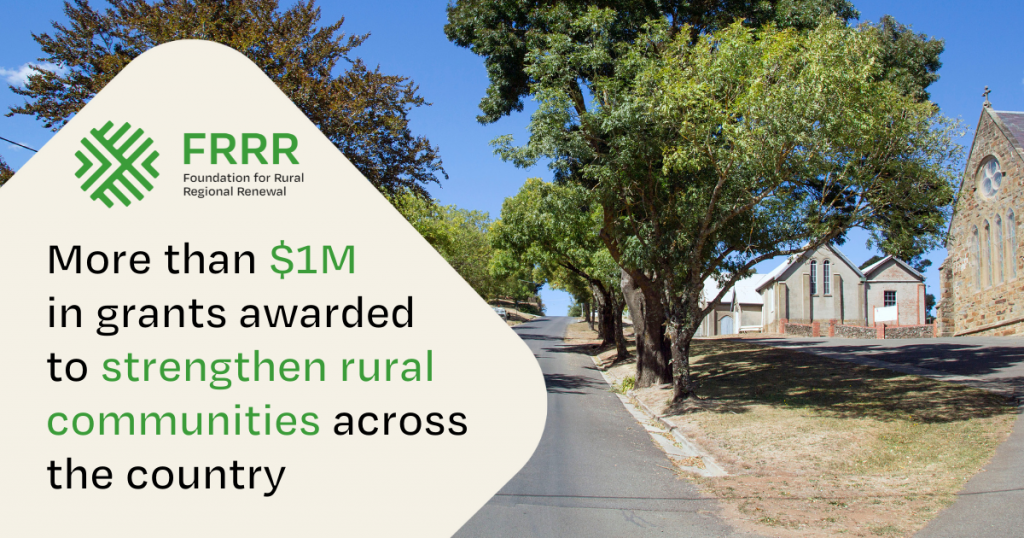
The SRC program supports a broad array of projects that address locally determined needs and priorities of smaller remote, rural, and regional communities, including places impacted by the 2019-20 bushfires.
For communities affected by the Black Summer bushfires, 34 community-led projects are sharing $602,958 in grants through SRC’s Bushfire Recovery stream of funding. These grants range from $2,618 for a communications upgrade for the Rocky Glen community in New South Wales, to $25,000 for a project that will improve the safety and security of the community hall at Tamrookum in Queensland.
A further $454,086 in grants have been awarded through SRC’s Small & Vital funding stream to 56 projects that local communities have prioritised for their long-term viability and vitality. Funding ranges from $550 for an equipment safety upgrade for the Riding for the Disabled WA group at Mount Barker in Western Australia, through to $10,000 for a grief support program for young people in Drysdale, Victoria.
Natalie Egleton, CEO of FRRR, said FRRR is seeing a wide range of requests from across the country, reflecting the diverse needs in each place.
“Rural communities continue to inspire and move forward despite the numerous difficulties they’ve faced and the uncertainty ahead. They want something to hope for, to build towards, and we continue to be here to support and celebrate their achievements and are ready to walk with them through any challenges they may be dealing with, or to harness any opportunities they have in front of them.
“With COVID-19 restrictions still being unpredictable, we want groups to know that if you have received a grant from us and, for whatever reason, you have had to delay, postpone or cancel your project, please reach out to our team. We want to work with you to adapt or redefine your project so that the funding stays in your community,” Ms Egleton explained.
With the 2021-22 bushfire season approaching, disaster preparedness is key, especially for those communities devastated by the 2019-20 bushfires.
“Being better prepared means different things for different places. For some, this means improving access to community meeting places, for others it’s ensuring they have the proper equipment and training so that volunteers can protect and support their community through a disaster event. But for some places, preparedness means completely rebuilding community infrastructure that was lost due to the bushfires,” Ms Egleton said.
“We are pleased to be able to provide this support to the communities that have been affected by the fires. And we’ll continue to support them as time goes on and their needs evolve and change.”
Some of the 90 projects awarded include:
- Lions Club of Ulladulla Milton, NSW – FAB (Farmers at Burrill) – $14,896 – Boost local spending with improved marketing and entertainment at the farmers markets.
- Engawala Arts Centre Aboriginal Corporation, NT – Developing the Engawala Arts Centre – $8,595 – Facilitate the set up and development of an Arts Centre that will build tourism-based income in a very remote community.
- The Little Pocket Association, QLD – Resilience through Nature Play – $25,000 – Support children and young families to build resilience and disaster preparedness through nature play, storytelling and strengthening connection to place.
- Tatiara District Council, SA – Tatiara Multicultural Food Festival – $9,900 – Encourage whole community engagement and build cultural awareness through the delivery of a food festival.
- Swansea Primary School Parents and Friends Association, TAS – Nature Play for Rural Families – $10,000 – Strengthen community connection to the natural environment and enhance educational activities for school children through the development of a Nature Play Garden area.
- Lakes Entrance Mechanics Institute Management Committee Inc, VIC – Replacement of Furniture as part of Maintaining and Redeveloping the Lakes Entrance Mechanics Institute Hall – $17,249 – Provide a fit-for-purpose facility and help volunteers to support their community through the purchase of stackable chairs.
- Active Farmers Ltd, WA – Active Farmers Games WA – Increasing Awareness of the Link Between Physical Activity and Improved Mental Wellbeing – $6,340 – Encourage rural communities to be physically active and more connected with inaugural WA Active Farmers Games.
The SRC program is collaboratively supported by a number of generous donors, which are listed on FRRR’s website.
The next round of SRC applications is currently being assessed and will be announced in December. The current round is accepting applications until 23 November 2021, with funds to be awarded in March 2022.
More information is available on FRRR’s website – https://frrr.org.au/ strengthening-rural-communities/.
To support grants like this through FRRR, make a tax-deductible donation at frrr.org.au/giving/.
The full list of grant recipients and their projects are below.
Jump to: NSW | NT | QLD | SA | TAS | VIC | WA
| Organisation | Project | Location | Grant | |||
|---|---|---|---|---|---|---|
| NEW SOUTH WALES | ||||||
| Bushfire Recovery | ||||||
| Mad Proppa Deadly Indigenous Corporation | ReVibe - Northern NSW Music Workshop Tour (Tamworth/Armidale) Inspire community to come together to celebrate culture through music writing, production and recording workshops. | Armidale | $25,000 | |||
| Trustees of the Roman Catholic Church for the Archdiocese of Canberra & Goulburn as Trustee for Marymead Child and Family Centre | Rural Rugby: Resilient Recovery Encourage young people to be active and enhance their mental health and nutrition through a school based after-school rugby enrichment program. | Batehaven | $25,000 | |||
| Campfire Co-op Ltd | Participatory Leadership Training for South Coast Bushfire Affected Communities Develop leadership skills by training community members in bushfire-impacted areas the Art of Hosting Conversations. | Bega Valley | $25,000 | |||
| Southcoast Health and Sustainability Alliance | Power on the Move Boost the community’s ability to respond to future disasters by purchase of a mobile generator, to be made available free of charge for use by the community. | Bodalla | $25,000 | |||
| Capital Region Community Services Limited | Bungee Youth Resilience Program in Braidwood Boost and strengthen the resilience of young people by running a creative art based program. | Braidwood | $21,432 | |||
| Lions Club of Ulladulla Milton | FAB (Farmers at Burrill) Boost local spending with improved marketing and entertainment at the farmers markets. | Burrill Lake | $14,896 | |||
| Comboyne Community Association Inc | Towards Opening Day Boost and strengthen the local economy by restoring the original farmhouse fireplace in the Comboyne Museum complex. | Comboyne | $9,200 | |||
| Copmanhurst Pre-School Inc | Aboriginal Mural and Art Lessons Improve access to local recovery activities for children and families at Copmanhurst Preschool by providing a local Indigenous artist to offer Indigenous Art classes and a mural at the centre. | Copmanhurst | $3,750 | |||
| Eden Community Access Centre Inc | Building Social Capital and Enhancing Social Outcomes Boost and strengthen the local economy by employing a Resilience and Recovery Officer to help find local solutions to bushfire recovery. | Eden | $25,000 | |||
| Marine Rescue Merimbula Volunteer Marine Rescue NSW | Marine Rescue Merimbula Training Computer Boost capacity of Marine Rescue Merimbula to provide essential volunteer training through the purchase of computer equipment. | Merimbula | $5,000 | |||
| Catholic Parish of St Mary's Star of the Sea Milton | Shoalhaven Rising from the Ashes - Stage 2 Boost the community’s bushfire recovery by hiring a coordinator to facilitate & create art-based community workshops. | Milton | $13,587 | |||
| Salt Care | Warehouse Food Storage Expansion Support for individuals and families living with disadvantage through the purchase and fit out of additional warehouse storage for distribution of needed personal and household items. | Nowra | $24,600 | |||
| Oberon and District Museum Society Inc | Fitout of New Forest and Timber Interpretive Center Boost local spending in Oberon by developing the Forest and Timber Interpretive Centre. | Oberon | $21,614 | |||
| Pambula Chamber of Commerce & Associates Inc | Pambula Art Project - Stage 2 Boost and strengthen the local economy through creation and installation of art trail murals. | Pambula | $25,000 | |||
| Borah Creek Public Hall Land Manager | Supply and Install Telstra and Optus YAGI Communications Systems in the Hall Improve the community's ability to communicate with the outside world in cases of emergency by installing a mobile phone signal boosting antenna. | Rocky Glen | $2,618 | |||
| First Steps Count Incorporated | Many Hands Build, Create and Unite - Our Design Journey Encourage people to come together and celebrate through art workshops leading to a collaborative artwork. | Taree | $25,000 | |||
| Manning River Aero Club Inc | MRAC Solar Boost the community’s ability to respond to future disasters by installing a solar power and battery system to provide a backup in case of power failures. | Taree | $25,000 | |||
| One Vision Productions Limited | EMPOWER our Community Celebrate and cultivate a sense of identity and cultural connection for Indigenous youth through Caring for Country music and film workshops. | Tweed Heads | $25,000 | |||
| Small & Vital | ||||||
| Bellingen Youth Orchestra Incorporated | Volunteer Management Strategy Increase the sustainability and profile of Bellingen Youth Orchestra and reduce volunteer fatigue through implementing a Volunteer Management Strategy and website. | Bellingen | $8,000 | |||
| Berry Branch Country Womens Association of NSW | Community Craft Workshops for a Sustainable Future Boost creativity, connection and support for local artists by providing a series of sustainable craft workshops. | Berry | $3,300 | |||
| Forbes Public School P&C Association Inc | Wiradjuri Mural Project at Forbes Public School Enhance community connection and cultural identity through Forbes Public School students painting a mural with local Wiradjuri Indigenous artist. | Forbes | $5,000 | |||
| Adavale Lane Community Centre Incorporated | Light Up and Cool Adavale Lane Community Centre Increase community usage and functionality by lighting up and cooling down the Adavale Lane Community Hall. | Goonumbla | $10,000 | |||
| Mona Magazine Western Riverina Arts Inc | Mona Women's Magazine - Second Edition Enhance rural women's identity, wellbeing and sense of place by printing the 2nd edition of Mona Magazine, paying for the contributors' pieces and contributing to wages for the editorial staff. | Leeton | $10,000 | |||
| Boori Dreaming Womens Group | Awakening the Dream Increase cultural identity and creativity through purchasing sewing machines, equipment and craft supplies for Boori Dreaming Women's Group. | Narrandera | $2,860 | |||
| Umina Beach Branch Country Womens Association of NSW | Build Accessible Ramp New entry and accessible bathroom with one accessible toilet and second toilet plus a shower. Increase accessibility of the Umina Beach CWA hall by installing a wheelchair accessible ramp. | Umina Beach | $4,325 | |||
| Tharpa Choeling Incorporated | Red Rattler Community Garden Increase community participation and connection by converting a vintage train carriage into a new community garden. | Wellington | $9,247 | |||
| Circartus Incorporated | Governance Guidance and Review Enhance community connection and creativity by engaging an industry- experienced governance consultant to ensure the sustainability of Circartus. | Wingham | $9,750 | |||
| Woodstock Branch Country Womens Association of NSW | Improving Our Street Cred Increase community participation and functionality through the refurbishment of the Woodstock Branch CWA hall. | Woodstock | $9,865 | |||
| NORTHERN TERRITORY | ||||||
| Small & Vital | ||||||
| Engawala Arts Centre Aboriginal Corporation | Developing the Engawala Arts Centre Facilitate the set up and development of an Arts Centre that will build tourism based income in a very remote community. | Engawala | $8,595 | |||
| West Daly Regional Council | Wadeye, Nganmarriyanga and Peppimenarti Annual Clean-up Day Reduce health and safety risks via a Community Clean Up Day to remove rubbish in remote communities. | Wadeye | $7,578 | |||
| Wagait Shire Council | Wagait Youth Program Encourage young people to be physically active and participate in community activities, with Youth Group excursions and skateboard clinics. | Wagait Beach | $6,000 | |||
| QUEENSLAND | ||||||
| Bushfire Recovery | ||||||
| The Little Pocket Association | Resilience through Nature Play Support children and young families to build resilience and disaster preparedness through nature play, storytelling and connection to place. | Beechmont | $25,000 | |||
| Wildlife Noosa Ltd | Noosa Bushfire Readiness & Myna Bird Project Support recovery from bushfires and volunteer training through purchase of a vehicle and equipment to improve disaster preparedness and conservation efforts. | Cooran | $12,248 | |||
| Charters Towers State Emergency Service Queensland Fire and Emergency Services | Ladder Racks for Operational Response Vehicles Support volunteers' safety and capacity to respond to emergencies through provision of ladder racks on response vehicles. | Pentland | $5,680 | |||
| Tamrookum Memorial Hall Incorporated | Hall Restoration Increase safety and support recovery through upgrade of community owned hall. | Tamrookum | $25,000 | |||
| Tin Can Bay Community and Mens Shed Incorporated | Storage Shed Support community recovery and wellbeing through purchase of a storage shed for materials and equipment. | Tin Can Bay | $15,336 | |||
| Small & Vital | ||||||
| Atherton Performing Arts Inc | Atherton Performing Arts Lighting Equipment - New Lighting Desk Console Expand the use of the Atherton Performing Arts theatre by installing a new lighting console. | Atherton | $7,997 | |||
| Barcaldine Rugby League Football Club Inc | "Bluey Live!" Kids' Concert, Meet & Greet Strengthen social connection and encourage culturally vibrant communities through a "Bluey Live!" kids' concert for the remote community of Barcaldine and surrounds. | Barcaldine | $10,000 | |||
| Beeron Road Country Club Inc | Beeron Road Country Club Community Hub Development Grow ways to support the community through refurbishment of a disused school into a vibrant rural Community Hub. | Beeron | $10,000 | |||
| Selectability Ltd | Selectability Mental Health Toolbox Improve mental health of remote communities by developing an online training course to strengthen community capacity to identify and support one another. | Cloncurry | $9,775 | |||
| Cooktown School of Art Society Inc | Computer System Plus Reception Area Upgrade Strengthen and increase volunteer capacity and access to online training, by installing a new computer system and reception desk. | Cooktown | $10,000 | |||
| Gloucester Sports and Recreation Ass Inc | Outdoor Theatre Promote recovery centre and encourage people to come together by installing an outdoor venue screen and projector. | Hideaway Bay | $10,000 | |||
| Malanda Chamber of Commerce Incorporated | Malanda’s Adventure Park Encourage children's development and increase community connection through installation of a fence around a new adventure playground. | Malanda | $10,000 | |||
| Gidgee Healing Mount Isa Aboriginal Community Controlled Health Services Limited | Women's Group Boost social inclusion and wellbeing through delivery of a monthly Women's Group for Indigenous women in Mount Isa. | Mount Isa | $10,000 | |||
| Highways and Byways Ltd | Seeds of Connection - Healing and Belonging Through Culture Enhance cultural identity, resilience and wellbeing of Indigenous children and their families in Roma by providing a two week cultural immersion program for 7-12 year olds. | Roma | $9,740 | |||
| Care Balonne Association Inc | Provide Safe Accessibility Services to Care Balonne Clients and Staff Improve the use and accessibility of the Care Balonne community hub through toilet facility upgrade. | St George | $10,000 | |||
| Texas Show Society | Upgrade to Showground Facilities Increase amenity and participation in community events by providing a grandstand for the Texas Showgrounds. | Texas | $10,000 | |||
| SOUTH AUSTRALIA | ||||||
| Bushfire Recovery | ||||||
| Adelaide and Hills Koala Rescue - 1300KOALAZ Incorporated | Vegetation Regeneration Planting Conserve native habitat and support recovery from 2019 bushfires through the restoration of bushland. | Cudlee Creek | $24,289 | |||
| Edithburgh Football Club and Sports Assoc | Community and Sporting Clubs Working to Improve Community Safety Improve a location that provides refuge in times of emergency through the installation of water tanks. | Edithburgh | $22,090 | |||
| Small & Vital | ||||||
| Andamooka Progress and Opalminers Association Inc | Community Facility Rationalisation & Development Project – Upgrade 'Old Community Church' to Passive Recreation Facility Encourage community engagement and social wellbeing by enhancing facilities. | Andamooka | $10,000 | |||
| Tatiara District Council | Tatiara Multicultural Food Festival Encourage whole community engagement and build cultural awareness through the delivery of a food festival. | Bordertown | $9,900 | |||
| Cummins & District Enterprise Committee | Winter Wonderland - Platform for Success Improve an organisation’s ability to support the community and strengthen the town's revenue through developing a storage shed used for the Cummins Christmas display. | Cummins | $4,140 | |||
| Bedford Kadina Bedford Phoenix Incorporated | Kadina Pergola and Deck for Supported Employees Expand supported employment opportunities for people living with a disability in Kadina through the construction of pergola and deck. | Kadina | $10,000 | |||
| The Food Embassy Incorporated | Supporting Citizens in Creating Local and Sustainable Food Systems Provide opportunities for local people to gain knowledge about growing and consuming healthy foods, through the delivery of the Food Matters program in Strathalbyn and Milang. | Strathalbyn | $9,585 | |||
| TASMANIA | ||||||
| Small & Vital | ||||||
| Lions Club of Lilydale Incorporated | Lilydale Men's Community Shed Support volunteer skill development and encourage social interaction, through the establishment of a Men's Shed in Lilydale. | Lilydale | $10,000 | |||
| Freycinet Volunteer Marine Rescue Association Inc | Putting You Through Now! Boost safety and disaster preparedness by installing telecommunications hardware at a remote Marine Rescue facility. | Swansea | $2,244 | |||
| Swansea Primary School Parents and Friends Association | Nature Play for Rural Families Strengthen community connection to the natural environment and enhance educational activities for school children through the development of a Nature Play Garden area. | Swansea | $10,000 | |||
| Coastal FM Inc | Development of Recording Studio Improve connection to community and broaden the capability of a community-run radio station through establishing a recording studio. | Wynyard | $5,000 | |||
| VICTORIA | ||||||
| Bushfire Recovery | ||||||
| Bright Spring Festival Bright and District Chamber of Commerce Incorporated | Bright Spring Festival Drive-In Movie Boost a community festival by providing a family-friendly activity and support recovery from the 2019/2020 bushfires by holding a drive-in movie night. | Bright | $5,000 | |||
| Cassilis Recreation Reserve Committee of Management | Living it Up Increase opportunities to support local connectedness and recover from the 2019/2020 bushfires through the delivery of a whole community music event. | Cassilis | $4,290 | |||
| Lakes Entrance Mechanics Institute Management Committee Inc | Replacement of Furniture as part of Maintaining and Redeveloping the Lakes Entrance Mechanics Institute Hall Provide a fit-for-purpose facility and help volunteers to support their community through the purchase of stackable chairs. | Lakes Entrance | $17,249 | |||
| Traralgon Men's Shed and Woodworking Inc | Mallacoota Picnic Tables and Benches Increase connection to place and build community partnerships through the provision of outdoor furniture for Mallacoota township. | Mallacoota | $20,000 | |||
| Mitta Valley Community TV Inc | Mitta Valley Community Translator Project Provide reliable communication transmission and safeguard the community through the upgrade of telecommunications equipment in a remote valley. | Mitta Mitta | $10,000 | |||
| 1st Myrtleford Scout Group The Scout Association of Australia Victorian Branch | Community is Key Provide a refuge in times of emergency and boost an organisation's capacity to offer a fit for purpose space through the upgrade of facility. | Myrtleford | $24,954 | |||
| Ramahyuck District Aboriginal Corporation | Ramahyuck Connection through Art Project Promote local culture, and support health and social recovery post-bushfires for First Nations people through painting the exterior of the Ramahyuck District Aboriginal Corporation building. | Sale | $8,910 | |||
| Community Centre Swifts Creek Inc | Roofing Rescue Improve the amenity of a community centre and create a safe, fit-for-purpose environment through the upgrade of a roof. | Swifts Creek | $21,660 | |||
| Wyeeboo Recreation Reserve | Wyeeboo Recreation Reserve - Water Tank Increase preparedness for future disaster events through the provision of a water tank. | Tallangatta Valley | $19,555 | |||
| Small & Vital | ||||||
| East Gippsland Ceramic Group Inc | Firing Up Encourage development of skills and social connection through the purchase of a pottery kiln and wheels. | Bairnsdale | $10,000 | |||
| Bendigo Queer Film Festival | Bendigo Queer Film Festival Post-COVID Relaunch Foster mental health and celebrate local culture and identity for a marginalised group through the delivery of a community film festival. | Bendigo | $6,565 | |||
| Wombat's Wish | Post-Camp Counselling Sessions Increase opportunities for bereavement support and improve the health, wellbeing and education outcomes for young people through the initiation of a grief support program. | Drysdale | $10,000 | |||
| Everton Primary School | Assisting with Cost of Construction of Outside Decking Encourage community gathering, and children's learning and development by installing decking at the local primary school. | Everton | $10,000 | |||
| Mittagundi Outdoor Education Centre | A Sustainable Kitchen for Mittagundi: Providing Life-Changing Experiences for Young People Increase connection to the environment and enhance educational experiences for young people through the upgrade of a communal kitchen. | Glen Valley | $3,200 | |||
| Eventide Lutheran Homes | Golf Buggy Funding Support health and wellbeing and encourage positive ageing, through the purchase of a mobility aid. | Hamilton | $10,000 | |||
| The Trustee for The MAC Trust | The Mac Goes Online Strengthen opportunities for employment, education and social engagement by providing an electronic ticket system for a community-run cinema. | Mansfield | $9,000 | |||
| Murtoa College | Murtoa College in Full Swing Encourage youth engagement and improve health and wellbeing through the installation of specialised playground equipment for senior students. | Murtoa | $10,000 | |||
| Murtoa's Big Weekend Shared Learning & Activities Murtoa Incorporated | ‘Light Up’ Murtoa’s Big Weekend in 2021 Support Murtoa township's economic recovery and strengthen social engagement through the delivery of a community festival. | Murtoa | $10,000 | |||
| Repair Cafe Bellarine Bellarine Training and Community Hub | Repair Cafe Bellarine Increase reach of a repair cafe service through the development and delivery of social media and marketing. | Ocean Grove | $2,515 | |||
| Romsey Neighbourhood House Inc | YOUTHINK Expand employment opportunities for youth by purchasing a barista machine for hospitality training. | Romsey | $9,145 | |||
| Surf Coast Energy Group (SCEG) | Spring Creek Sustainable Futures - Surf Coast, Victoria Boost the community’s ability to learn about conservation management and increase connection to place through the delivery of community engagement workshops. | Torquay | $9,930 | |||
| Yarrawonga Neighbourhood House Inc | Connecting our Community through Education and Information Enhance the delivery of first aid training programs and encourage further education, by purchasing appropriate equipment that reflects real-life medical trauma. | Yarrawonga | $9,406 | |||
| WESTERN AUSTRALIA | ||||||
| Small & Vital | ||||||
| Albany Youth Support Association | Safe Space for Homeless Youth to Sleep in Swags Increase access to temporary housing for young people sleeping rough by enclosing verandah at emergency accommodation facility. | Albany | $7,230 | |||
| Live To Tell Your Story Inc | Djinda Ngardak - Making it My Business Promote healthy lifestyles and improved health and wellbeing while growing opportunities for Indigenous students to pursue careers in hospitality, with week-long cooking skills camp. | Albany | $10,000 | |||
| Enterprise Partnerships WA Limited | Piriwa Place Making Project Support economic opportunities for Indigenous women while increasing access to affordable clothing with expansion of innovative Op Shop project. | Balgo | $10,000 | |||
| Jarlmadangah Burru Aboriginal Corporation | Cultural Centre Entrance Improvements Increase comfort and amenity through refurbishment of Cultural Centre’s entrance with installation of a shade sail. | Derby | $9,196 | |||
| Greenbushes Community Resource Centre | The New You - Working Through Change And Loss Help people to recover and adapt through delivery of workshop on coping with change and loss. | Greenbushes | $1,650 | |||
| Marble Bar Primary School | STEM Education Increase engagement in school in remote community through provision of virtual reality equipment to enhance innovative digital arts program. | Marble Bar | $9,958 | |||
| Riding for the Disabled WA Plantagenet Group Inc | Equipment Maintenance and Safety Support riding program for children with a disability, with OH&S upgrade of trailer used for transporting riding equipment. | Mt Barker | $550 | |||
| Nungarin Heritage Machinery & Army Museum Inc | Aunty Jim's (re) Store Enhance authentic historical shop display within the Nungarin Machinery & Army Museum, with new linoleum floor coverings. | Nungarin | $6,500 | |||
| Active Farmers Ltd | Active Farmers Games WA - Increasing Awareness of the Link Between Physical Activity and Improved Mental Wellbeing Encourage rural communities to be physically active and more connected with inaugural WA Active Farmers Games. | Torbay | $6,340 | |||
In the last 12 years, the beloved community garden in Devonport, Tasmania has become a hub for local residents, where they come together for a range of activities. The garden is very popular among volunteers, seniors and the elderly, schools and people with disabilities in the community. For these groups in particular, the Community Garden is a place to socialise, grow and harvest local produce and get some fresh air.
Devonport Community House (DCH) has overseen the care and maintenance of the garden and surrounding areas since 1938. When they noticed the deteriorating condition of the wooden sleepers containing each of the more than 30 garden beds, they knew it was time for an upgrade.
With a $10,909 donation by the Thyne Reid Foundation, the DCH were able to purchase “ewood” sleepers to replace the rotten wooden sleepers. The ewood sleepers are more durable and are made of recycled plastic that will ensure at least 50 years of garden bed life, making them a sustainable investment for the Community Garden.
The process of replacing the wooden sleepers took only a few weeks and has helped to give new life to the Community Garden that has already given so much to the residents of Devonport. These improvements have not only increased the longevity of the garden but have also increased food security for the 20-50 people a week who access the garden through FoodShed, a food distribution organisation that helps farmers make profit.
In the 12 years that the garden has been operational, DCH has been able to see the joy it has given many of the residents. With the long life expectancy of the ewood sleepers, the success and activity around the garden looks set to continue long into the future.
29 projects funded to support drought-impacted communities
FRRR has awarded $1,264,396 in grants to 29 projects that will support communities across the country that are experiencing prolonged rainfall shortages. The funding is through its award-winning grants program[1], Tackling Tough Times Together (TTTT).
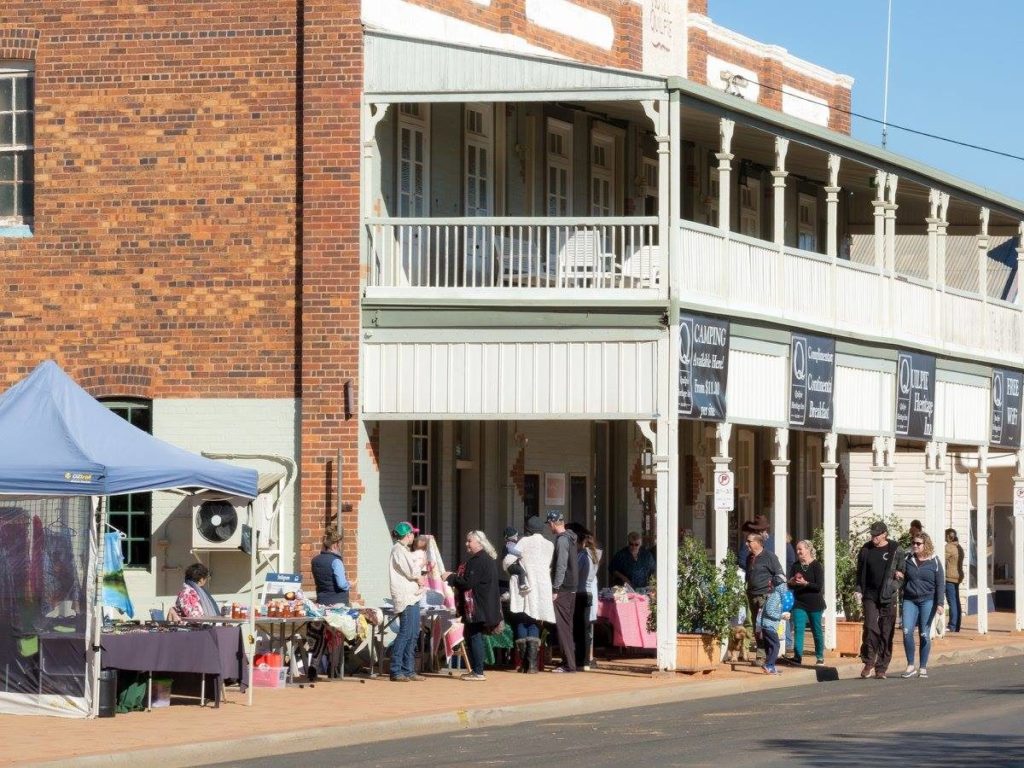
The grants will help drought-impacted regions access the resources needed to bring people together, so they can feel connected and supported. These places, like many parts of remote, rural and regional Australia, continue to face the real and persistent challenges caused by Australia’s Big Dry. Despite rainfall across some areas, these extended dry periods and long-term rainfall deficits may continue for some time.[2]
Nina O’Brien, FRRR’s Disaster Resilience and Recovery Lead, said that the TTTT program encourages communities experiencing the Big Dry to take the lead in their recovery and renewal.
Many places facing long-term rainfall shortages have seen their local economy hit. These resilient communities are finding ways to strengthen their economy and encourage local spending and tourism. For Orroroo Carrieton, the District Council is boosting the local economy by developing the Black Rock Wool Press Rotunda as a local attraction. The Rotunda will showcase local historic artifacts including the restored Black Rock Wool Press.
“Other places like Washpool in South Australia and Cecil Plains in Queensland, are renewing their regions by upgrading local facilities to give people a place where they can come together in safety and comfort.
“We are delighted to be able to award these grants to help turn local ideas into reality. We know it’s challenging to get these projects off the ground in the midst of a pandemic, especially when many are dealing with reduced local fundraising capacity, and fatigued volunteers.
“We want people experiencing drought to know that there is still funding available. TTTT is a flexible grant program specifically designed to support communities as they move to recovery. Our team will work with you to help make your project happen, even if it might look a bit different to what you’d initially planned, in light of COVID-19,” Ms O’Brien explained.
Some of the 29 projects awarded this round include:
- District Council of Orroroo Carrieton, SA – Black Rock Wool Press Rotunda – $143,252 – Boost local economy and tourism opportunities by supporting the development of the Black Rock Wool Press Rotunda to showcase local historical artefacts including the restored Black Rock Wool Press.
- ABC Foundation Limited, WA – AWRAE: Aboriginal Women’s Research Assistant & Evaluation Training Project – $60,000 – Create opportunities for Indigenous women of Carnarvon and surrounds to develop leadership skills by training them to research and evaluate projects delivered in Indigenous communities.
- Gooloogong Historical Society Incorporated, NSW – Stage 1 – Restoration and revitalisation of Gooloogong’s meeting place – $59,752 – Reduce volunteer fatigue and increase community connections and sense of place by restoring the Gooloogong Clubhouse to house the Gooloogong Historical Society.
- Drillham Primary Parents and Citizens Association, QLD – Along the Garden Path – $13,000 – Reduce social isolation and encourage people to come together and connect through a two-day creative arts workshop program.
- Wheatbelt Business Network Incorporated, WA – Accredited Mental Health First Aid Training in the Wheatbelt – $26,300 – Develop community leaders’ skills and training to provide support for their communities by engaging them in Mental Health First Aid training.
Applications for the TTTT program are always open and groups in drought-affected areas are encouraged to apply for funding to help their community come together to tackle the drought. Grants are available for a broad range of grassroots, community-led initiatives that directly and clearly benefit local communities.
The cut-off dates for future rounds are:
- 24 May 2021. Outcomes will be advised late August 2021. (Note: Stage One for the $150,000 grant tier must be received by 13 April). Outcomes will be advised late November 2021.
- 24 August 2021. (Note: Stage One for the $150,000 grant tier must be received by 12 August). Outcomes will be advised late November 2021.
Tackling Tough Times Together is possible thanks to the collaborative support of several donors, including the Australian Government which committed $15M to be distributed over three years. Generous contributions have also been made by Pratt Foundation, Stockland CARE Foundation, Paul Ramsay Foundation, The Snow Foundation, Tim Fairfax Family Foundation, Henroth Group and private donors from across the nation.
To support grants like this through FRRR, make a tax deductible donation here.
Jump to: SA | NSW | QLD | VIC | WA
|
Organisation |
Project |
Location |
Grant |
|---|---|---|---|
|
SOUTH AUSTRALIA |
|||
|
Up to $150,000 |
|||
| District Council of Orroroo Carrieton | Black Rock Wool Press Rotunda Enhance economic recovery and renewal through the development of the Black Rock Wool Press Rotunda showcasing local historical artifacts including the restored Black Rock Wool Press. |
Orroroo | $143,252 |
| Wilmington Progress Society Incorporated | Wilmington Community Multipurpose Gym Facility Project Reduce social isolation by facilitating strong social cohesion and connections and increase organisational capacity through the construction of a multipurpose community facility. |
Wilmington | $108,367 |
|
Up to $60,000 |
|||
| Auburn Southern Gateway Committee Auburn Community Development Committee |
Auburn Southern Gateway Enhance economic recovery and renewal through the installation of town entrance statement signage for the Auburn township in the South Australia Clare Valley. |
Auburn | $43,826 |
| Washpool Hall Management Committee Spalding District Incorporated |
Washpool Hall Kitchen and Rear Lobby Revitalisation Reduce volunteer fatigue and build the capacity of the Washpool Hall through the upgrade of the kitchen and rear lobby area. |
Washpool | $60,000 |
|
NEW SOUTH WALES |
|||
|
Up to $60,000 |
|||
| Gilgandra Museum and Historical Society Incorporated | Experience our Amazing History @ Gilgandra Rural Museum Reduce volunteer fatigue and build the capacity, capability and sustainability of the Gilgandra Museum and Historical Society Incorporated through upgrading the kitchen, exhibition/meeting room flooring, lighting, audio equipment and promotional brochure. |
Gilgandra | $50,909 |
| Gooloogong Historical Society Incorporated | Stage 1 – Restoration and Revitalisation of Gooloogong’s Meeting Place Reduce volunteer fatigue and increase opportunity for community cohesion through the restoration of the Gooloogong Clubhouse to house the Gooloogong Historical Society. |
Gooloogong | $59,752 |
| Lower Lachlan Community Services Incorporated | Roof Over Community Support the capacity and sustainability of Lower Lachlan Community Services through the replacement of the roof. |
Lake Cargelligo | $50,000 |
| Mandagery Public Hall Land Manager | Improved Amenities for the Mandagery Hall Build the capacity of the Mandagery Public Hall Land Manager with upgrades to the amenities with an Eco-Flo toilet system. |
Mandagery | $55,000 |
|
Up to $20,000 |
|||
| Coleambally Community Club Limited | Installation of Tesla Battery for Solar Power Storage Support climate resilience and sustainability of the Coleambally Community Club through the purchase of a Tesla power wall battery for excess power storage. |
Coleambally | $19,841 |
| Tullera Community Hall Incorporated No Y17180 27 | RAMP US UP Reduce social isolation and support strong social cohesion and connection with an upgrade of a disabled access ramp at the Tullera Community Hall. |
Tullera | $18,000 |
|
QUEENSLAND |
|||
|
Up to $60,000 |
|||
| Bloomin Beautiful Blackbutt Festival Incorporated | Blackbutt Arts Strategy, Big Avocado and Arts Project Officer: Towards a Strategic Future Support stronger economies and sustainability of local tourism events with the development of the Blackbutt Art Strategy and a Project Plan to build a Big Avocado in Blackbutt. |
Blackbutt | $58,744 |
| Broxburn Music Club | Staged for Success Reduce volunteer fatigue and build the capacity of Broxburn volunteers with the repair and upgrade of the stage and the construction of a lockable shed at The Broxburn Community Grounds. |
Broxburn | $58,401 |
| Cecil Plains History Group | Relocation and Restumping of Norwin CWA Hall Build the capacity of the Cecil Plains History Group through the relocation and restumping of Norwin CWA Hall to provide an all-weather space for historical displays and a community meeting space. |
Cecil Plains | $55,000 |
| Goondiwindi Pastoral and Agricultural Society | Fencing for the Future Reduce volunteer fatigue and build the capacity of the local organisation to support their community through drought with the installation of internal zone fencing at the Goondiwindi Showgrounds. |
Goondiwindi | $60,000 |
| Mondure Public Hall Committee Incorporated | The Mondure Public Hall Amenities Refurbishment including a Disabled Toilet Support the capacity and sustainability of the Mondure Public Hall Committee with upgrades and refurbishment to amenities. |
Mondure | $58,680 |
| Mulga Mates Centre Incorporated | Playground upgrade Reduce volunteer fatigue, and support sustainability and capacity of Mulga Mates Centre with the installation of a playground to improved early childhood development. |
Quilpie | $53,958 |
| Outback Festival Incorporated | ‘Giants of the Outback’ Reduce social isolation and enhance economic recovery through the delivery of the 2021 Outback Festival in Winton, QLD. |
Winton | $45,000 |
| Roma Historical Precincts Incorporated | Preparation of a Business Case to be used as a Supporting Document for the Development of the Roma Butter Factory Support organisational capacity and sustainability with the development of a business case to support the redevelopment of the Roma Butter Factory as a visitor experience to boost economic activity and visitation in Roma. |
Roma | $49,800 |
| Tansey Show Society Incorporated | Purchase Shaded Grandstands and Water Troughs for Tansey Showgrounds Build the capacity of Tansey Show Society through the purchase of two transportable shaded grandstands. |
Tansey | $23,848 |
|
Up to $20,000 |
|||
| Bullyard Hall, Sports and Recreation Club Incorporated | Assisting the disabled Reduce social isolation and build community participation opportunities through the installation of an access ramp at Bullyard Hall. |
Bullyard | $9,460 |
| Drillham Primary Parents and Citizens Association | Along the Garden Path Reduce social isolation through the provision of creative arts activities enabling the community of Miles to come together and connect during times of hardship. |
Miles | $13,000 |
| Guides Queensland – Warwick District Guides Queensland |
Refresh and Replacement of the Floor Coverings in 1st Warwick Girl Guide Hut Reduce volunteer fatigue and build the capacity, capability, and sustainability of the 1st Warwick Girl Guide Hut through refreshing and replacing floor coverings |
Warwick | $9,878 |
| Outback Gondwana Foundation Limited | Futureproofing with a Forklift Reduce volunteer fatigue and build the capacity of Outback Gondwana Foundation by supplying a forklift. |
Eromanga | $20,000 |
| Stanthorpe Agricultural Society | Gotta get a Gator! Reduce volunteer fatigue and build the capacity of Stanthorpe Agricultural Society through the purchase of a ‘Gator’ utility vehicle to support community events held at the facility. |
Stanthorpe | $19,140 |
| Warra Tennis Club Incorporated | Serving for Sustainability with Solar Panels Reduce volunteer fatigue and build the capacity and sustainability of the Warra Tennis Club through the purchase and installation of a solar panel system. |
Warra | $8,710 |
| Maranoa Regional Council | Ignite and Excite: Career Pathway Taster Support opportunities for learning and education participation at Roma, Mitchell, Injune and Surat with the Ignite & Excite: Career Pathway Taster project. |
Roma | $5,530 |
|
VICTORIA |
|||
|
Up to $20,000 |
|||
| Yaapeet Community Club Incorporated | Turkey Bottom Lake – Picnic Shelter Reduce volunteer fatigue and enhance opportunities for social cohesion and connection through the construction of picnic shelter at Turkey Bottom Lake. |
Yaapeet | $20,000 |
|
WESTERN AUSTRALIA |
|||
|
Up to $60,000 |
|||
| ABC Foundation Limited | AWRAE: Aboriginal Women’s Research Assistant & Evaluation Training Project Enhance opportunity for leadership development and skills training for Indigenous women of Carnarvon and surrounds, through the delivery of the Aboriginal Women’s Research Assistant and Evaluation Training Project (AWRAE) focused on research and evaluation for projects delivered in Indigenous communities. |
Carnarvon | $60,000 |
| Wheatbelt Business Network Incorporated | Accredited Mental Health First Aid Training in the Wheatbelt Support leadership development and skills training in Wheatbelt Business Network through the delivery of Mental Health First Aid Training. |
Quairading | $26,300 |
[1] 2020 Australian Philanthropy Awards – Best Grant Program
[2] Australian Government Bureau of Meteorology. Drought Rainfall deficiencies and water availability. 7 October 2020. Retrieved from https://bit.ly/2I1PSqA.
The Friends of St Brigid’s (FoSB) Association Inc is a community organisation formed in 2006 after the closure of the local Church and Hall in Crossley, Victoria. The group purchased the buildings and are now caretakers of the five-acre community-owned and operated precinct which celebrates 150 years of unique Australian Irish history in south-west Victoria. The facilities include a 1914 Romanesque Church and community hall, home to the St Brigid’s Australian Irish Cultural, Heritage and Community Centre, and have evolved to include the Crossley Men’s Shed and peace and healing gardens.
FoSB has a long partnership with FRRR, opening a Not-for-Profit Fundraising Account in 2011, which was subsequently renewed in regularly in the intervening years, and again this year. The Fundraising Account assists them to raise much needed funds to contribute to ongoing facilities upgrades that allow people of all abilities to access and participate in activities at the precinct.
FoSB’s typically holds many events during the year through which much of their income is generated. However, like many community organisations, the onset of COVID-19 brought a halt to their regular events such as concerts and hiring out facilities for public and private events.
The year had started out well, with a Blues & Roots Festival in early January, two private family functions in February, and then two events in March. However, they were left with a COVID-quandary – how to find alternative ways to raise funds and / or reduce their overheads.
FoSB Treasurer Sue Elms said their first action was to request relief from paying their monthly mortgage instalments and insurance premiums. While that granted them a brief reprieve, the stark reality remained that they still had to find the funds for future payments.
This led to the organising committee donning their thinking caps, with considerable success thanks to the enthusiasm of their Committee Members and many volunteers, which highlighted the tenacity and commitment of FoSB’s.
They came up with a list of alternate fundraisers, which included the Men’s Shedders cleaning and reselling 600+ old bricks; a bus outing with appropriate social distancing measures in place; a walk and talk event, which was a great financial and social success; a letter of appeal was sent out to members and past supporters; and a 50:50 raffle raised more than $2,500.
FRRR’s Philanthropic Services Manager, Jo Kemp, says that it is innovative responses like these that will help community groups overcome the challenges that the pandemic has presented.
“I’m so impressed with FoSB’s response to the unexpected situation we all find ourselves in. They have successfully come together and adjusted their plans to find other ways to meet their financial obligations, and continue to serve their community. However, it is an ongoing challenge and they continue to seek donations to support their operations,” she said.
FoSB would appreciate your support for this initiative. If you’d like to explore having a fundraising account for your community project, contact Jo Kemp, FRRR’s Philanthropic Services Manager.
If you’re looking for advice on how your community group can respond to the COVID crisis, there are lots of resources available such as those listed on the OurCommunity website.

